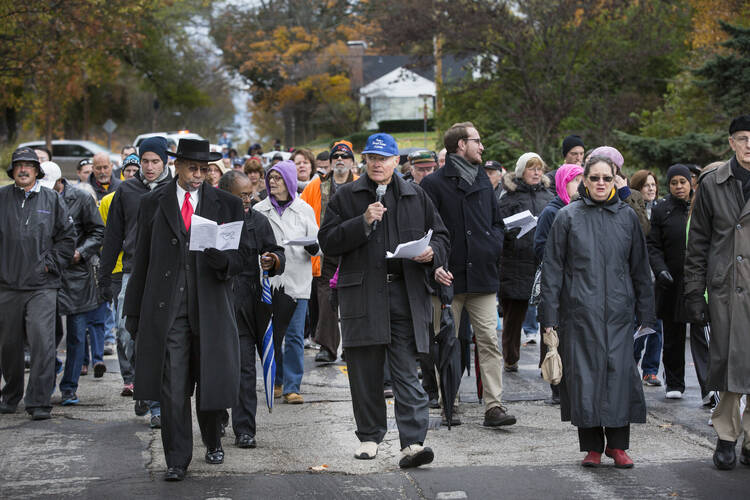This isn't going away. Mike Brown died on the street in Ferguson, Mo., on August 9. It is December, and the protests won't stop. One incident after another feeds the fury. Here in New York City, people have clogged Times Square and Grand Central Terminal night after night. Across the country, business as usual is being disturbed in hundreds of different ways. These actions communicate that they are not solely about Mike Brown, or Eric Garner, but about a status quo that makes entire populations in this country feel like Mike Brown and Eric Garner every day. In this wave of resistance, they are finding a voice. They are rooting out demons. And they are asking for solidarity.
On December 8, a group of Catholic theologians issued a statement on racial justice meant to address the ongoing crisis in which U.S. society has found itself. (Signer no. 2, of around 200 at this writing, is Alex Mikulich, co-author of the book The Scandal of White Complicity in U.S. Hyper-Incarceration, which I reviewed in America last year.) Echoing past statements of the U.S. bishops and Pope Francis, the theologians commit themselves to stronger action and deeper reflection. They also call for a Lenten fast this Advent:
We pledge to fast and to refrain from meat on Fridays during this Advent season and through the seasons of Christmas and Epiphany, as well as during Lent, as a sign of our penitence and need of conversion from the pervasive sin of racism.
There are a number of other points that deserve our attention. For instance, while supporting the work of police, they point to the dangerous militarization of police departments. They suggest that it might be time for a truth and reconciliation commission on racial justice—an idea that has been gaining momentum lately. And they commit to “placing our bodies and/or privilege on the line” in the cause of social change. America contributor Kaya Oakes became notorious on Twitter for sympathizing with her students who are doing just that.
One omission in their commitments that's striking to me is the absence of economic proposals. The statement, nevertheless, quotes these words of Pope Francis:
The poor and the poorer peoples are accused of violence, yet without equal opportunities the different forms of aggression and conflict will find a fertile terrain for growth and eventually explode.… This is not the case simply because inequality provokes a violent reaction from those excluded from the system, but because the socioeconomic system is unjust at its root.
Despite echoing this analysis, the theologians refrain from taking on economy directly. Many of the other lists of demands related to this current crisis do highlight economic justice—such as Ferguson Action, which calls for housing and full employment. Toward the end of his life Martin Luther King Jr. came to recognize that civil rights would mean little without economic justice; this, along with his opposition with the war in Vietnam, was perhaps what made him most threatening of all.
A growing movement in U.S. black communities has been looking toward cooperative economics—which I discussed in my latest column and a follow-up on the blog—as an ideal foundation for economic self-determination. In Jackson, Miss., Cooperation Jackson has been leading the way. Jessica Gordon Nembhard's recent book, Collective Courage: A History of African American Cooperative Economic Thought and Practice, is an indispensable reminder that black cooperativism is nothing new.
Read the statement. Pray with it, and reflect, and respond. This crisis is a crisis for all of us.









While the circumstances of the Ferguson case are indeed complex—complex enough to warrant a real jury trial, in my opinion—the primary motivation of the protests stems from the fact that people around the country feel, on a day to day basis, that they are being treated unfairly, that their lives matter less in this society than those of others. Strong signs of racism appear in Ferguson in several ways: a nearly all-white police force in a largely black community; the failure to treat Mike Brown's body with respect, which the police eventually apologized for; the shockingly militarized response of the police to the early protests, the likes of which I have never seen in years of covering protest movements in the United States; Officer Wilson's use of dehumanizing language like "demon" in his testimony about Mike Brown.
Are white Americans "by nature" racist? I suspect on some level what we call "racism"—the tendency to treat fellow human beings as belonging to a subhuman race—is something in every human being because of what we Christians call original sin. However, given the history of slavery and white supremacy in the United States, I do think there is particular reason for concern about white racism in this country. The book mentioned above, The Scandal of White Complicity, gives an excellent account of this problem in terms of Catholic theology, and I highly recommend it.
As a Christian, above all, I hold an abiding faith that God's grace, and God's love in us, can and does overcome that brokenness we bear. I think the theologians' statement is less an attempt to place blame and resentment on white Americans than to welcome that saving grace into a difficult situation.
This is a haunting comment, thank you. I would add to this the posture that Catholic spokespeople often make that presumes the Catholic voice to be a white one. Of course this is nonsense; while the Catholic hierarchy in the United States is overwhelmingly white, at least 40 percent of U.S. Catholics are not. In my own experience, much of my knowledge of the NYPD's stop-and-frisk policies comes from conversations with black and brown members of my parish in Brooklyn. I hope that the present national outcry against racism will also encourage us Catholics to lift up more voices that reflect our true diversity.